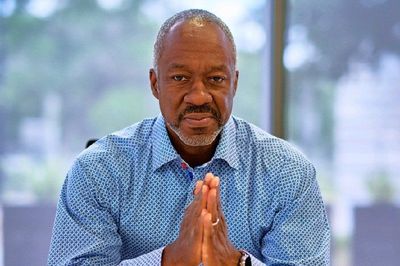
Wogbe Ofori, founder and chief strategist of WRX Companies, joins the Houston Innovators Podcast to discuss hardtech and Houston as an energy transition city. Photo via LinkedIn
The energy transition has momentum, according to Wogbe Ofori. But there's still a ways to go.
Ofori, the founder and chief strategist of WRX Companies, is an adviser to Nauticus Robotics and strategist to Intuitive Machines and Jacobs, he's also served as a mentor across the local innovation community. He's narrowed in on hardtech and has has gotten a front-row seat to observing what's happening in Houston amid the energy transition, as he explains on this week's episode of the Houston Innovators Podcast.
Listen to the episode and read an excerpt below.
EnergyCapital: Looking back on some of the recent trends of the energy transition, what have you observed?
Wogbe Ofori: The energy transition has been something that — through the last hype cycle that started in the second half of 2020 and lasted until the first quarter of 2022 — was part of that momentum along with Web3. Now, the energy transition is continued as Web3 has fallen off a cliff and now been replaced by AI, but the energy transition is continued. Where I think moving into the next major stage where now it’s time for them to actually be proven out. And these things are hard and take time to be proven out and these technologies to mature. Then for the products and services that are derived from them, to really find the right place within the market and the right use cases. The idea that there is some sort of silver bullet — whether it be hydrogen or something else — that's going to solve the problem for all use cases is completely unrealistic. The issue is that a lot of folks especially the big energy players — the O&G majors here — they know that.
EC: So, what does this next stage look like?
WO: Now we're moving into what I think is a really interesting period where it's going to be, “well do we really have the legs for this race?” Because we sprinted, and everybody got really excited. Now you starting to hear, “well you know some investors are a little worried that cleantech 2.0 might suffer some of the same fate as cleantech 1.0.” How do we avoid that? Will investors have the patience to continue to make investments into energy transition plays for the longer term, because we’re going to need that to make these transitions. It's not going to happen overnight.
EC: Where does Houston come in on all this?
WO: Well the other big question that’s being asked around is, “Can Houston actually lead this?” It's difficult for an incumbent to disrupt itself. We’ve been positioning ourselves as moving from the energy capital of the world to the energy transition capital. I'm all for it, and I'm 100 percent behind it. Now we are just at the place where we're really going to start to see the difference between those who were caught up in the excitement of the energy transition, and those who really have the faith to see this thing through. The ones who do have the faith to see this through are going to create some fantastic companies that are going to create real value and that will materially change the way we live. But it’s going to take time and be hard.